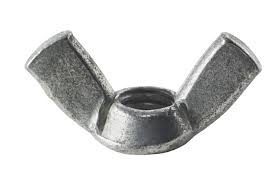Our Products
We manufacture standard size of nuts which are used in standard bolts. In case of specialization we manufacture customized nuts for customers as per the requirements. We have variety and wide ranges for nuts.
Nuts and bolts go through various quality checks under supervision of technical team. Our expertise includes a wide range of fasteners which is the resultant of highly qualified and trained staff.
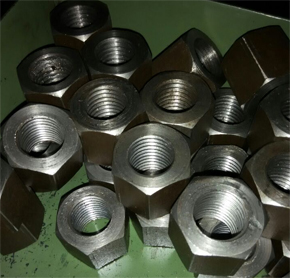
Acorn Nuts (Cap Nuts)
The acorn nut is a type of fastener which gets its name from its shape. Acorn nut is its common name and it is also called a crown hex nut, blind nut, cap nut or domed cap nut. It is a nut that has a domed top to cover the threads. This is to prevent contact with the external thread to protect the threads or protect other things the threads would rub against. In addition the dome gives a more finished appearance. It is usually made of brass, steel, stainless steel (low carbon content) or nylon. It can also be chrome plated and given a mirror finish.

Barrel Nuts
A barrel nut (also known as steel cross dowel or dowel nut) is a specialized nut, and is commonly used in aerospace and ready-to-assemble furniture applications.
Barrel nuts are also common in flat-pack furniture, where long bolts and barrel nuts are used to hold together T joints in chipboard sheets.

Cage Nuts
A cage nut or caged nut (also called a captive or clip nut) consists of a (usually square) nut in a spring steel cage which wraps around the nut. The cage has two wings that when compressed allow the cage to be inserted into the square holes, for example, in the mounting rails of equipment racks.
The square-hole cage nut can be used wherever a square hole can be punched. An older alternative type of captive-nut uses a spring clip that holds the nut and slides on the edge of a thin sheet.

Clip-on Nuts
A clip-on nut, also known as a sheet metal nut or a speed nut (but this is ambiguous, see speed nut), is a type of nut designed to be clipped to sheet metal. It is a type of captive nut commonly made as a cage nut.
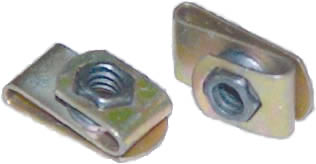
Coupling Nuts
A coupling nut also known as extension nut is a threaded fastener for joining two male threads, most commonly threaded rod. The outside of the fastener is usually a hex so a wrench can hold it. Variations include reducing coupling nuts, for joining two different size threads; sight hole coupling nuts, which have a sight hole for observing the amount of engagement; and coupling nuts with left-handed threads.
These are used to make up long rod assemblies from shorter lengths of rods.
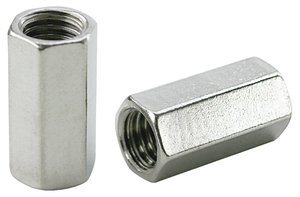
Cross Dowel
The Cross Dowel is made of steel for strength.
A slot in outer surface eases allignment with the bolt. Cross Dowel and decorative bolt are ideal for connections requiring high strength values.

Flange Nuts
A flange nut is a nut that has a wide flange at one end that acts as an integrated, non-spinning washer. This serves to distribute the pressure of the nut over the part being secured, reducing the chance of damage to the part and making it less likely to loosen as a result of an uneven fastening surface.
The flange may be serrated to provide a locking action. The serrations are angled such that they keep the nut from rotating in the direction that would loosen the nut.
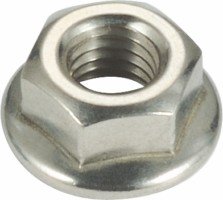
Insert Nuts
An insert nut provides a threaded socket for a wooden workpiece, similar to a wall anchor. Insert nuts are inserted into a pre-drilled hole by one of two means: screw in and hammer in. In both cases, the external protrusions bite into the wood, preventing the nut from either turning or pulling out.
Insert nuts are advantageous over barrel nuts and T-nuts, because they can be installed from one side of the workpiece.
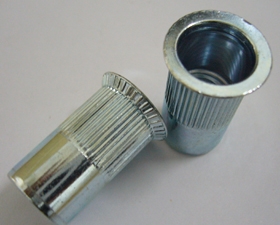
Nyloc Nuts
A nyloc nut, also referred to as a nylon insert lock nut, polymer insert lock nut or elastic stop nut, is a kind of nut that includes a nylon collar insert. These nuts are also referred to as "nylok" or "nylock".
The plastic insert is placed at the end of the nut and its inner diameter (ID) is slightly smaller than the major diameter of the screw.
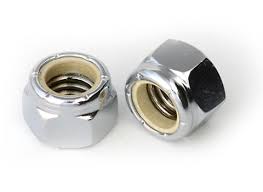
Square Nuts
A square nut is a four-sided nut. Compared to standard hex nuts, square nuts have a greater surface in contact with the part being fastened, and therefore provide greater resistance to loosening (though also greater resistance to tightening)

Swage Nuts
A swage nut or self-clinching nut is a type of nut or threaded insert is used on sheet metal. A PEM nut is a popular brand name by Penn Engineering & Manufacturing Corp, which is often used generically for swage nuts from any manufacturer.
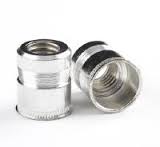
T Nuts
A T-nut, T nut, or tee nut (also known as a blind nut, which can however also refer to a rivet nut) is a type of nut used to fasten a wood, particle or composite materials workpiece, leaving a flush surface.
It has a long, thin body and a flange at one end, resembling a T in profile. The flanges of T-nuts often have hooks or serrations on the prongs that dig into a wooden work piece as the bolt is tightened from the opposite side of the piece, providing better retention.
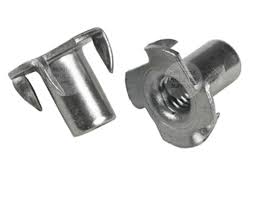
Weld Nuts
A weld nut is a special type of nut specifically designed to be welded to another object. There are various types for different applications.
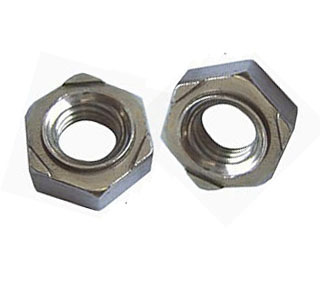
Wing Nuts
A wingnut or wing nut is a type of nut with two large metal "wings", one on each side, so it can be easily tightened and loosened by hand without tools.
